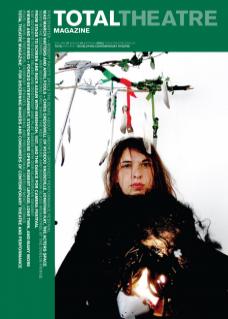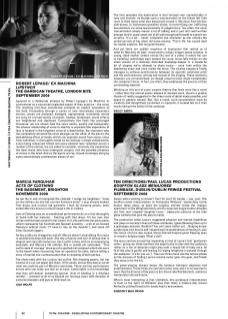Lipsynch is a deliberate attempt by Robert Lepage’s Ex Machina to concentrate on a perceived neglected aspect of their practice – the voice. The resulting nine-hour commission presents an explicit excavation of the field. Proceeding through a series of nine interrelated characters’ stories, voices are analysed, damaged, appropriated, translated; words are sung (in a broad variety of styles), howled, fantasised; sound effects are heightened and displaced. Cumulatively this feels like prolonged discourse: we are shown how the voice works, aurally and biologically; the intense relationship of voice to identity is unpicked (the experience of loss is located in the forgotten voice of a dead father, the character who has completely retrained his voice emerges as the villain of the piece); the destabilising effect of media, which can separate sound from scene, voice from individual, is thoroughly mined as we witness a single melodramatic scene being rehearsed, filmed and every element later redubbed across a number of the stories; we are asked to consider, variously, the experience the deaf, those who have undergone surgery, and the possible presence of voices in the head. And so the layers accrue, moved clunkingly along by some astonishingly cumbersome pieces of set.
The nine episodes this exploration is shot through veer unpredictably in tone and content, as though such a concentration on the theme left little room to think about what was being built around it. We move from kitchensink drama, to hackneyed gumshoe cliché, to hard-hitting sex trafficking documentary via some spectacularly ill-judged farce. Too often, the vocal concentration simply means a lot of talking and it just isn’t well written enough (and in some cases not at all well enough performed) to sustain our scrutiny. ‘It’s a bit… banal’ complains one character as she unlocks the verbal secrets of her silent old home movies, ‘That’s life’ her savant deaf lip-reader explains. But not good theatre.
And yet there are sudden eruptions of expression that remind us of what Ex Machina do best: visual poetry whose images speak volumes. A young, dead mother strides across the roof of a plane in which her son is travelling unwittingly back toward his roots; snow falls thickly on the silent visions of a mentally disturbed bookshop-keeper in a masterful bit of staging we’re allowed to share twice – once from within the deadening snow and once inside the store. The closing sequence finally manages to achieve synchronicity between its operatic emotional pitch and the performances, writing and visuals of the staging. These moments, however, are circumscribed: as though visual lyricism might contaminate the company’s focus. In fact, too often, they emphasise the poverty of their surrounding material.
Working on this sort of scale creates theatre that feels more like a novel – rather than the normal poetic ellipses of devised work, there’s a greater illusion of reality suggested in the sheer scale of detail made possible, and space to gesture toward. But, like a novel, such accumulation must be carefully and thoughtfully controlled. In Lipsynch, it instead felt as if their words had got the better of the company.

